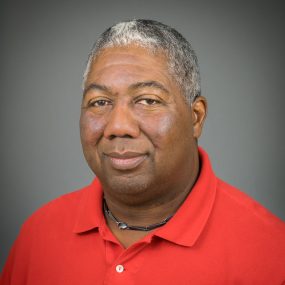Sam Cook

Sam Cook
Sam Cook holds four decades of experience in forest management and higher education. He has worked in leadership positions to help develop and manage forest operations. Cook is the Executive Director of Forest Assets and Vice President of the Natural Resources Foundation at North Carolina State University College of Natural Resources. His experiences highlight his expertise in leadership, forest management and operations, natural resources, and community development.
"you need to be a people person. You also need to be the person of your word" - Sam Cook, Sustainable Forestry Initiative & MANRRS, 2023
Sam Cook always loved being outside. Growing up in Alabama, he was part of the Boy Scouts, the Future Farmers of America, and the Extension, all contributing to his love for nature. His father also worked for a paper mill, and his brother worked at WestRock, a leading sawmill business. Both showed him the technical skills of the forestry sector. He would pursue a Forestry degree at North Carolina State University and an A.S. in Forestry from Tuskegee University.
Cook started as a Forest Technician for the U.S. Department of Agriculture Forest Service in 1979. After earning his B.S. from North Carolina State University, he worked at International Paper, serving until 2007. Cook served in various capacities with the organization, with his most recent position as Eastern
Region Fiber Supply Regional Manager. Afterward, he briefly joined Roanoke Land Development in 2007 as a Project Director and Forest Manager before joining the Waccamaw Community Foundation. With the organization, he provided consulting for small businesses and non-profit organizations. From 2011 to 2013, Cook served as the Director of Programs at Waccamaw Community Foundation, overseeing the grant process's review, analysis, and implementation. He worked in a similar capacity for the Center for Heir's Property Preservation as their Director of Forestry. This project was funded by the U.S. Endowment of Forestry and Communities, Inc., in partnership with the USDA, Forest Service, Natural Resource Conservation Service& Farm Service Agency. In addition, Clemson University, Lowcountry Housing Trust, SC Forestry Commission, and the Black Family Land Trust, among others, helps fight against oppressive systems that commonly stripped heirs' property owners of their, many of whom are communities of color. Cook works for North Carolina State University in the College of Natural Resources as their Executive Director of Forest Assets and Vice President of the Natural Resources Foundation. As Executive Director of Forest Assets, he oversees and manages operations at forests owned or managed by the N.C. State Natural Resources Foundation, Inc. He ensures that operations align with the university's values and strategic planning and adhere to state and federal policies.
Alongside his many successes, Cook has experienced numerous challenges, including racism and discrimination. As a Black man entering the forestry industry at a time when few others existed, he had to learn how to get over racist people and comments. Cook cites that he built armor to preserve because he loves what he does. Moreover, seeing other young Black students succeed in the industry motivates him to continue his work as a role model.
Cook highlights the importance of mentorship to his career development. His first mentor was a teacher, coach, and Boy Scouts Master. Walter Davis. Davis helped Cook throughout school and was a vital role model as his parents were busy working multiple jobs. Such a relationship, Cook says, helped him get to where he is today. Additional mentors include Larry Jervis from North Carolina State University and Bob Beason, his first boss at International Paper.
Cook advises the next generation of foresters and environmentalists to identify how to apply their skills to positions and opportunities available. Knowing where to use your skills can be challenging since they may be applied differently in different positions. Learning to highlight your skillset can help you identify a pathway in the sector. Cook also emphasizes the importance of being a team player and embracing leadership, stating that "you need to be a people person. You also need to be the person of your word" (Sustainable Forestry Initiative & MANRRS, 2023)
Black Faces in Green Spaces: The Journeys of Black Professionals in Green Careers. Sustainable Forestry Initiative and Minorities in Agriculture, Natural Resources and Related Sciences. (2023). Retrieved February 16, 2024.
Sam Cook. LinkedIn. (n.d.). Retrieved February 16, 2024 from https://www.linkedin.com/in/sam-cook4/
Sam Cook Jr [Photo]. NC State University College of Natural Resources. Retrieved February 16, 2024 from https://cnr.ncsu.edu/directory/scook4/
(JEDSI) Survey and interviews conducted by Justice, Equity, Diversity, and Sustainability Initiative staff. 2022-2024. Yale University-School of the Environment. New Haven, Connecticut.
Sam Cook Jr [Photo]. NC State University College of Natural Resources. Retrieved February 16, 2024 from https://cnr.ncsu.edu/directory/scook4/